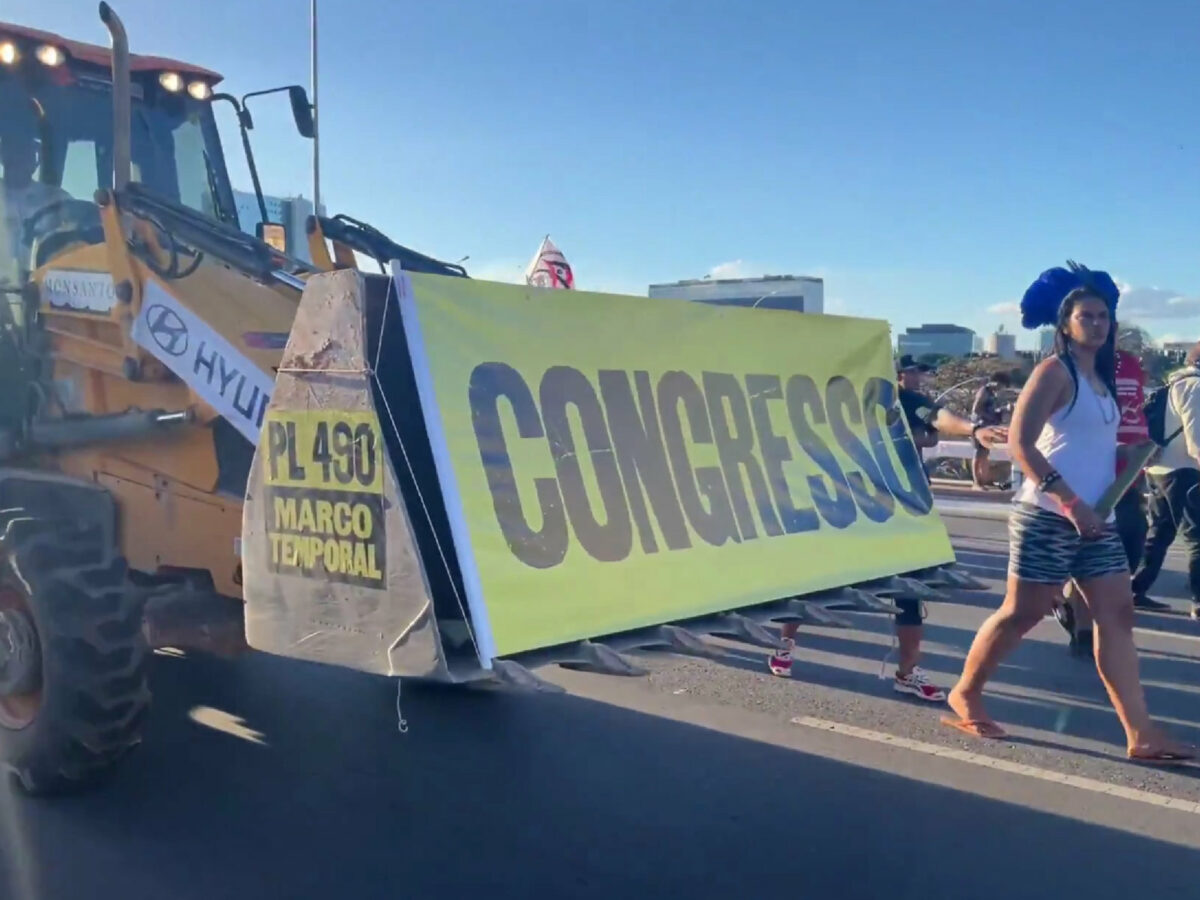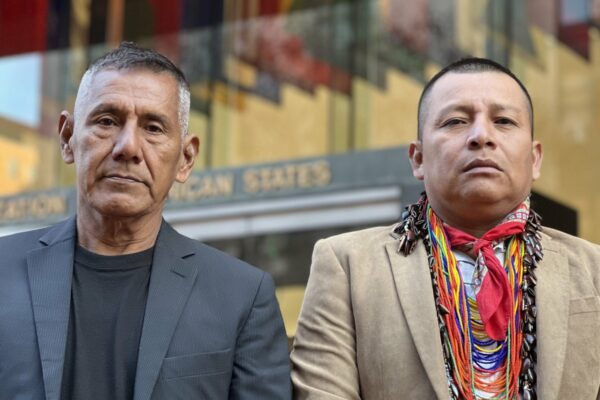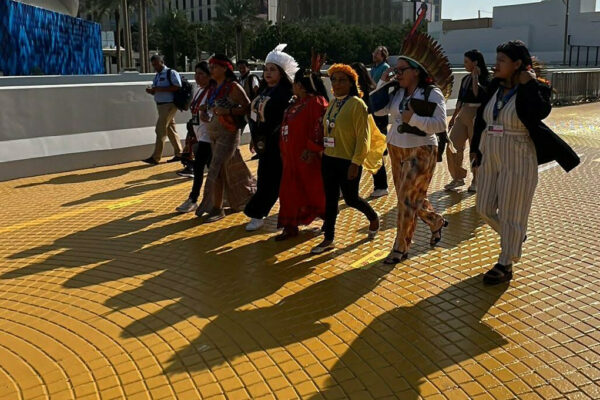In Brazil, the current status of Indigenous rights and territories is confusing to outside observers. 2023 will be remembered as the year when the Brazilian Supreme Court finally concluded the Marco Temporal trial after more than a decade of process and consideration, and it explicitly declared this fundamental attack on Indigenous rights to be unconstitutional. At the time, this was hailed as a major and definitive victory that would immediately advance the recognition of many Indigenous territories.
However, as we enter 2024, we find ourselves in a strangely familiar setting: the Marco Temporal thesis has returned to the Supreme Court for reconsideration. Once again, the Indigenous movement, environmentalists, and society at large are watching as the highest court in Brazil prepares to rule – again – on the constitutionality of the doctrine. How did we get here?
What is Marco Temporal?
The “Marco Temporal” thesis is a fundamental political attack against Indigenous land rights led by Brazil´s reactionary agribusiness sector, initiated immediately after the approval of the Forest Code reform in 2012. Marco Temporal serves as its primary legal offensive, presenting an ad-hoc legal argument asserting that Indigenous peoples who were not present on their lands at the time of the Federal Constitution’s ratification on October 5, 1988 are not entitled to the recognition of their traditionally-occupied lands. Remarkably, this temporal cutoff was never mentioned in the Brazilian Constitutional Assembly of 1987-88, nor is it found in the text of the Constitution or any legislation. It is an invention of the agribusiness sector, a violent political project seeking legal validation for theft of Indigenous lands
The Supreme Court’s rejection of the Marco Temporal thesis was arguably the most significant victory of the Indigenous movement in the 21st century. It marked the culmination of years of grassroots organizing, legal struggles, and mobilization. However, the battle for Indigenous rights unfolded simultaneously in the National Congress, where the agribusiness caucus wields an overwhelming majority. Just a few days after the court declared Marco Temporal unconstitutional, Congress passed Bill 2903, which not only reasserted the thesis that had just been struck down, but also introduced several new proposals that are explicitly hostile to the constitutional rights and livelihoods of Indigenous peoples.
To be clear, Bill 2903 represents a radical escalation in agribusiness’ efforts to undermine the constitutional and legal framework safeguarding Indigenous rights. In a complete reversal of the intercultural rationale embedded in Brazil’s Federal Constitution, the bill authorizes the planting of GMO crops in Indigenous territories. It also permits the construction of energy and other infrastructure projects within these same territories without seeking the consultation and consent of Indigenous peoples. Moreover, it relaxes the policy of non-contact with Indigenous peoples in voluntary isolation and empowers the government to reclaim demarcated Indigenous lands by asserting that Indigenous groups no longer adhere to their traditional customs, among other abhorrent provisions.
Following the legislative process, the bill was submitted for presidential review. President Lula da Silva vetoed 47 of its provisions, thereby eliminating a substantial portion (though not all) of its anti-Indigenous content. In the veto, the president explicitly deemed the Marco Temporal and numerous other provisions unconstitutional.
However, on December 14, in a bold political maneuver orchestrated by the agribusiness caucus, a majority of deputies and senators voted to override 41 of these vetoes, including the Marco Temporal provision. The Congress only upheld President Lula’s vetoes regarding the retaking of Indigenous land for altering cultural traits, the planting of GMO crops on Indigenous lands, and contact with isolated peoples. On December 28, the modified bill was published as Federal Law 14.701, constituting the most radical attack against Indigenous rights since democracy was restored in Brazil.
What comes next?
All of this has led to where we find ourselves now: fighting the same battle again before the Supreme Court. On the day that Federal Law 14.701 came into effect, three right-wing political parties filed a suit asking the Court to recognize its validity, essentially nullifying its own ruling that Marco Temporal is unconstitutional. The Declaratory Action of Constitutionality 87 was assigned to Justice Gilmar Mendes, known for his close ties to agribusiness and anti-Indigenous decisions. The Liberal, Progressive, and Republican parties argue that the law addresses a significant political dispute and request the Supreme Court to affirm its constitutionality, especially concerning sections that had been vetoed by the President and later overridden by Congress.
The Indigenous movement and progressive political parties have also actively petitioned the Supreme Court. In the closing days of 2023, three constitutional review suits were filed, urging the Court to declare not only the unconstitutionality of the Marco Temporal but also of the other clauses included in Federal Law 14.701. The first of these suits was filed by APIB and two political parties – PSOL and Rede Solidariedade – seeking a declaration of the entire legislation as unconstitutional and, therefore, unenforceable. According to APIB, Federal Law 14.701 would not only increase rights violations and violence against Indigenous communities but also lead to environmental degradation and worsen the climate crisis.
A few days after APIB filed its lawsuit, a second constitutional review request was submitted by President Lula’s Workers Party (PT), the Communist Party of Brazil, and the Green Party. Initially, all of these parties were expected to jointly endorse the lawsuit filed by APIB challenging the entire law, but in the end the PT opted to seek constitutional review of only the articles that had been vetoed by Lula.
The APIB petition acknowledges more than the veto of the Marco Temporal, encompassing articles that were not addressed in President Lula’s initial veto. These include provisions allowing the possibility of establishing military bases and other military interventions, strategic expansion of the road network, exploration of energy alternatives of a strategic nature without consulting Indigenous communities, actions by the armed forces and the Federal Police in Indigenous areas without consultation with the involved communities or the competent federal Indigenous body, and the authorization for public authorities to install equipment, communication networks, roads, and transportation routes on Indigenous lands.
While the Supreme Court is likely to reaffirm its stance on the unconstitutionality of the Marco Temporal thesis, the fate of the other articles in the law remains uncertain. The Indigenous movement is gearing up for another protracted legal and political battle.
Simultaneously, there is a likelihood that the Indigenous movement will intensify pressure on the government to expedite the demarcation of Indigenous lands awaiting declaration by the Ministry of Justice. This would pave the way for these processes to reach the final stage of presidential approval. And, last but certainly not least, Congress continues to be a hostile force. Anticipating the potential annulment of Federal Law 14.701 by the Supreme Court, the agribusiness caucus has already initiated the formulation of a new legislative proposal — this time, a constitutional amendment – aimed at restricting Indigenous rights. Their strategy hinges on the belief that amending the Constitution would limit the Supreme Court’s authority to overturn reform.
And so, we enter a new year with some very real and significant victories to celebrate, while fending off attacks and attempts to nullify not only these victories but fundamental guarantees of Indigenous rights founded in Brazil’s Constitution and achievements that were hard-won over decades of political organizing and grassroots mobilization.














